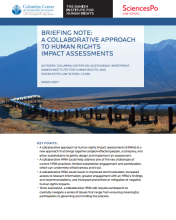/ library resources
Showing items 1 through 7 of 7.Continued overexploitation of natural resources and the associated impacts of climate change threaten the sustainability and biodiversity of our global social-ecological systems.
In a world where natural capital is often unpriced or undervalued, thus making resource exploitation very lucrative, environmentally degrading activities will continue to dominate the economy.
Pervasive food insecurity and poverty in much of the world drives vulnerable populations to harvest natural resources as a means of generating income and meeting other household needs.
Economists argue that land rent taxation is an ideal form of taxation as it causes no deadweight losses. Nevertheless, pure land rent taxation is rarely applied. This paper revisits the case of land taxation for developing countries.
This paper provides guidance on how to integrate consultation and FPIC principles into investor-state contract negotiations to actively involve project-affected communities and better safeguard their land rights and human rights.
This paper provides guidance on how to conduct collaborative and participatory risk assessments, paying attention to the human rights of project-affected people.
This briefing note, co-authored with the Danish Institute for Human Rights and the Sciences Po Law School Clinic, outlines a new approach to conducting human rights impact assessments (HRIAs) of
Land Library Search
Through our robust search engine, you can search for any item of the over 73,000 highly curated resources in the Land Library.
If you would like to find an overview of what is possible, feel free to peruse the Search Guide.




